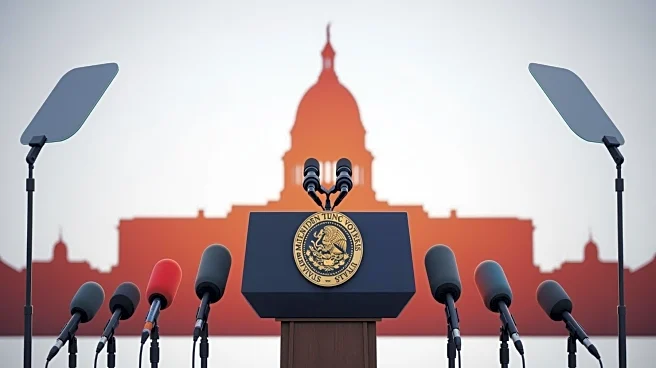What's Happening?
Willie Velásquez, a pivotal figure in the history of Latino political empowerment in the United States, is being celebrated for his contributions to mobilizing Latino voters. Velásquez, who lived from
1944 to 1988, was instrumental in transforming the Latino electorate into a significant force in U.S. politics. His efforts are particularly recognized during Latinx Heritage Month and the 50th anniversary of the 1975 Voting Rights Act, which marked a turning point for Latino voting rights. Velásquez's advocacy led to increased voter registration and participation among Latinos, culminating in a record 16.5 million Latino voters casting ballots in the 2020 elections. His work addressed systemic barriers such as poll taxes, gerrymandering, and voter intimidation, which historically disenfranchised Mexican Americans in Texas.
Why It's Important?
The legacy of Willie Velásquez is crucial in understanding the growing influence of Latino voters in U.S. elections. As of 2024, 36.2 million Latinos were eligible to vote, highlighting the demographic's potential impact on political outcomes. Velásquez's efforts have contributed to a more representative democracy, ensuring that Latino voices are heard and considered in policy-making processes. This shift not only empowers Latino communities but also influences national political strategies, as parties and candidates increasingly recognize the importance of engaging with Latino voters. The continued mobilization of this electorate could lead to significant changes in political dynamics and policy priorities in the United States.
What's Next?
The ongoing recognition of Willie Velásquez's contributions suggests a continued focus on expanding Latino voter engagement and addressing remaining barriers to participation. Advocacy groups and political organizations may intensify efforts to educate and mobilize Latino voters, particularly in states with large Latino populations. Additionally, there may be increased scrutiny on voting laws and practices to ensure they do not disproportionately affect minority communities. As the Latino electorate grows, political parties are likely to develop strategies to appeal to this demographic, potentially reshaping campaign approaches and policy platforms.
Beyond the Headlines
Velásquez's work highlights broader issues of racial and ethnic representation in U.S. politics. His legacy prompts discussions on the ethical and legal dimensions of voting rights and the importance of inclusive political systems. The historical context of discrimination faced by Mexican Americans underscores the need for continued vigilance against practices that undermine democratic participation. Velásquez's story also serves as an inspiration for future generations of activists seeking to address inequalities and promote civic engagement.









